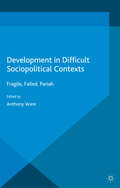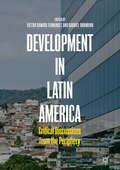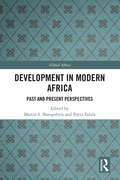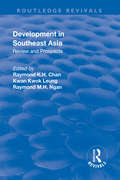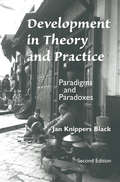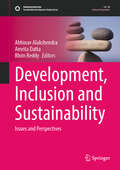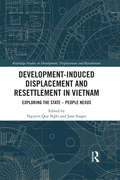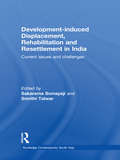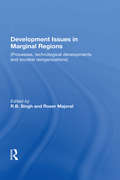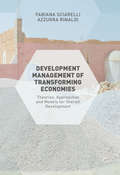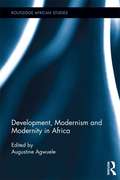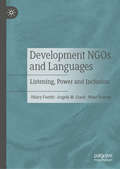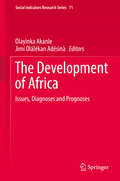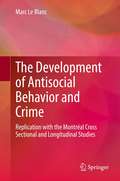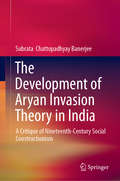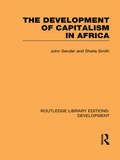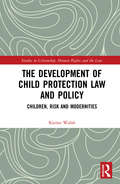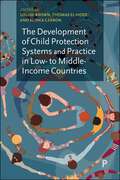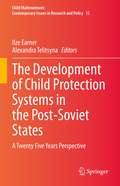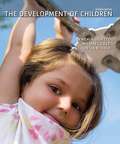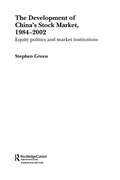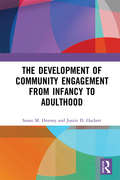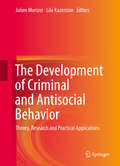- Table View
- List View
Development in Difficult Sociopolitical Contexts
by Anthony WareThis edited volume explores development in the so-called 'fragile', 'failed' and 'pariah' states. It examines the literature on both fragile states and their development, and offers eleven case studies on countries ranking in the 'very high alert' and 'very high warning' categories in the Fund for Peace Failed States Index.
Development in Latin America: Critical Discussions from the Periphery
by Víctor Ramiro Fernández Gabriel BrondinoThis edited volume discusses the development theory advanced by the Economic Commission for Latin America and the Caribbean (ECLAC) in the 1940s, and its transformations through the second half of the twentieth century. In this time frame, the authors identify two approaches: structuralism (1950-1980) and neo-structuralism (1980-onwards). The contributors describe the transition in terms of economic theory and policy; the conceptualization of the State; and the consideration of space on regional and global scales. They argue that structuralism is still relevant for understanding the current problems of development if a careful and appropriate recovery and update of its main ideas and concepts is made in relation to the current context of globalization and internationalization of production and finance.
Development In Modern Africa: Past and Present Perspectives (Global Africa)
by Martin S. Shanguhyia Toyin FalolaDevelopment in Modern Africa: Past and Present Perspectives contributes to our understanding of Africa’s experiences with the development process. It does so by adopting a historical and contemporary analysis of this experience. The book is set within the context of critiques on development in Africa that have yielded two general categories of analysis: skepticism and pessimism. While not overlooking the shortcomings of development, the themes in the book express an optimistic view of Africa’s development experiences, highlighting elements that can be tapped into to enhance the condition of African populations and their states. By using case studies from precolonial, colonial, and postcolonial Africa, contributors to the volume demonstrate that human instincts to improve material, social and spiritual words are universal. They are not limited to the Western world, which the term and process of development are typically associated with. Before and after contact with the West, Africans have actively created institutions and values that they have actively employed to improve individual and community lives. This innovative spirit has motivated Africans to integrate or experiment with new values and structures, challenges, and solutions to human welfare that resulted from contact with colonialism and the postcolonial global community. The book will be of interest to academics in the fields of history, African studies, and regional studies.
Development in Southeast Asia: Review and Prospects (Routledge Revivals)
by Kwan Kwok LeungThis title was first published in 2002.The region of Southeast Asia has been one of the focal points for study in academic circles. Most of the studies concentrate on the economic development but social development received relatively lesser attention. The region has undergone a period of rapid transition and development in various aspects, such as education, social security, poverty reduction, labour protection, health, social structure and politics. The financial crisis in 1997 has posed a serious threat to most of the countries and territories in the region, and unavoidably affected the social development achieved in the past decades. This text is dedicated to examining the development and achievement of various social aspects in the region. It discusses the challenges and potential of this region in the twenty-first century. It is of considerable reference value and benefits those who want to have an overview and critical understanding of the issues of social development in Southeast Asia.
Development In Theory And Practice: Paradigms And Paradoxes, Second Edition
by Jan Knippers BlackAs wealthy countries focus more attention on the ravages of poverty and maldistribution of the world's resources, the rationales for what is or is not done in the name of ?development? have become more elaborate and abstract. And as the literature has proliferated, communication among those who approach development from different perspectives, disciplines, and professions has become more strained. In this innovative text, Jan Black argues that what is missing is ?appropriate theory? that can help place the findings of social scientists and seasoned development practitioners at the service of those who would promote a more equitable and empowering approach to development.In the first section, the author presents the differing and even contradictory definitions of development and the various explanatory models and means of measurement associated with them. This is followed by an analysis of the evolution of development strategies and programs both of the First World?donor countries and organizations?and of Third World leaders, movements, and regional organizations. The author highlights key issues in the development debate of the 1990s, including ecology, refugees, debt, the informal sector, and gender roles. In a final section, she addresses the process of development and illustrates, through a number of vignettes and case studies, the sometimes illusory links between motives and consequences. The second edition includes more paradoxes and case studies and increased coverage of refugees and indigenous peoples. More information on the new states in post-Soviet East and Central Europe is also incorporated.At a time when theoreticians and practitioners appear to occupy different worlds and speak different languages, and when a large number of developing countries seem to be falling into an irreversible cycle of debt and dependency, this book is particularly welcome and compelling.
Development, Inclusion and Sustainability: Issues and Perspectives (Sustainable Development Goals Series)
by Abhinav Alakshendra Amrita Datta Bhim ReddyThis book addresses the overarching theme of promoting inclusive and sustainable development through twelve contributions that discuss perspectives from emerging economies and policies for a better world. The contributions are divided into four sections -- Employment and Livelihoods; Capabilities and Mobilities; Sustainable and Inclusive Urbanization; and Perspectives for Policies. The first section contains two chapters that deal with employment and labour markets. In the second section, there are four contributions that discuss capabilities (education and health) and their roles in intergenerational mobility, contributing to poverty reduction and inclusive development. The third section comprises of four chapters concerning various aspects of urbanisation in diverse empirical contexts. And the last section consists of two contributions providing policy perspectives. The volume is thus a diverse mix of empirical research and provides critical insights into the Global South’s development process. It is an important reference for all those concerned with sustainable and inclusive development.
Development-Induced Displacement and Resettlement in Vietnam: Exploring the State – People Nexus (Routledge Studies in Development, Displacement and Resettlement)
by Nguyen Quy Nghi Jane SingerThis book explores the complex legal, cultural, economic and human rights issues associated with development-induced displacement and resettlement (DIDR) in Vietnam. As in many parts of the world, urban expansion and large-scale infrastructure projects in Vietnam often rely on forced land acquisition, which can result in the involuntary resettlement of households and entire communities. This book examines the adequacy of monetary and in-kind compensation and the support that resettlees need for successful integration into host communities and for sustainable livelihoods and improved well-being. It presents new paradigms and practices that place affected households at the centre of project planning and implementation to fully address the needs of the most vulnerable. This includes women, the elderly, and ethnic minority groups. Bringing together research evidence, practical experience, and insights of distinguished researchers, this book is the first to systematically examine DIDR in Vietnam, a single-party state seeking to balance state interests with the demands of investors and civil society for human rights and participation by affected people. Combining the latest evidence and research findings on development-induced displacement and resettlement in Vietnam with practical experiences in project implementation, this book will be a useful guide for researchers across development, migration, and Southeast Asian Studies, as well as practitioners and policy makers. Its lessons will also be relevant to other countries facing rapid development.
Development-induced Displacement, Rehabilitation and Resettlement in India: Current Issues and Challenges (Routledge Contemporary South Asia Series)
by Sakarama Somayaji Smrithi TalwarCompulsory land acquisition and involuntary displacement of communities for a larger public purpose captures the tension of development in the modern state, with the need to balance the interests of the majority while protecting the rights of the minority. In India, informal estimates of involuntary resettlement are estimated to be around 50 million people over the last five decades, and three-fourths of those displaced still face an uncertain future. Growing public concern over the long-term consequences of this has led to greater scrutiny of the rehabilitation and resettlement process, particularly for large development projects. This book examines a number of new policy formulations put in place at both the central and state levels, looking at land acquisition procedures and norms for rehabilitation and resettlement of communities. The book combines a theoretical analysis of the proposed regulatory framework with detailed case studies that examine the application of these norms in specific geographic contexts across the country. It brings together contributory analysis by some of the country’s most engaged administrators, academics, and activists in the field, and is a useful contribution to Development Studies.
Development Issues In Marginal Regions: Processes, Technological Developments, And Societal Reorganizations (Routledge Revivals Ser.)
by R. B. Singh Roser MajoralRapid population growth, demand for increased food resources and other political,economic and social stresses have all contributed to building up pressure fordevelopment of marginal regions in both developed and developing countries.Ecological issues are also adding up to and increasing marginalization of regionsand social groups due to the pressure on natural resources. Broadly speakingmarginal regions are perceived in concepts of centre-periphery (fringes) and boundariesand frontiers. In developing countries marginal regicns are the combinedeffects of ecological, economic and social factors. For understanding the abovecomplex issues, the Study Group on Development Issues in Marginal Regionswas established in August 1992 at the Washington International GeographicalCongress.
Development Management of Transforming Economies
by Fabiana Sciarelli Azzurra RinaldiThis insightful book offers a new and innovative tool in the study of development. The authors propose 'The Overall Development Model' which provides a strategy for long-term, sustainable and adaptable development for countries around the globe. Starting with a comprehensive study into what development is and how it is achieved, Development Management of Transforming Economies critically analyzes current development schemes within transforming economies and examines their various actors both international and local, public and private. It examines the implementation of health, education and economic strategies of countries in Africa and Asia that have either undergone a development process, experienced slow but steady progress, or are just beginning to pursue a development strategy. In considering human development as a whole, the authors assert a new method of development that includes the developing population, and highlights the need for countries to define their own unique development process.
Development, Modernism and Modernity in Africa (Routledge African Studies)
by Augustine AgwueleThis anthology examines the "unfinished project of modernity" with respect to the unrealized potential for economic, social, and political development in Africa. It also shows how, facing the consequences of modernism, Africans in and out of the continent are responding to these unfinished projects drawing on (a) the customary, (b) the novelty of modernity, and (c) positive aspects of modernism, for the organization of their societies and the enrichment of their lives even as they contend with the negative aspects of modernity and modernism.
Development NGOs and Languages: Listening, Power and Inclusion
by Hilary Footitt Angela M. Crack Wine TesseurThis book addresses, for the first time, the question of how development NGOs attempt to 'listen' to communities in linguistically diverse environments. NGOs are under increasing pressure to demonstrate that they 'listen' to the people and communities that they are trying to serve, but this can be an immensely challenging task where there are significant language and cultural differences. However, until now, there has been no systematic study of the role of foreign languages in development work. The authors present findings based on interviews with a wide range of NGO staff and government officials, NGO archives, and observations of NGO-community interaction in country case studies. They suggest ways in which NGOs can reform their language policies to listen to the recipients of aid more effectively.
The Development of Africa
by Olayinka Akanle Jìmí Olálékan AdésìnàThis volume analyses many of the real development challenges confronting the African continent, presenting fresh and current objective examinations, narratives, interpretations and pathways to the continent’s development. It interrogates and answers established, critical, current and pragmatic problems confronting Africa today, and provides workable pathways out of the development problems, so that scholarship, policy and practice will be positively impacted. This volume adds great depth and extended breadth to the knowledge base on development of Africa. It provides excellent resources for academics, scholars, student, policy makers and all those interested in issues affecting Africa’s development.
The Development of Antisocial Behavior and Crime: Replication with the Montreal Cross Sectional and Longitudinal Studies
by Marc Le BlancThis innovative and timely work explores how the developmental criminology paradigm can be applied to understandings beyond criminal careers, to the development of more general antisocial behavior. Importantly, the rich data set from 50-years of cross sectional and longitudinal studies provides replication amongst samples, genders, generations and phases in the life span, from cohorts born in the 1960s, 1970s, 1980s, and 1990s. This work also provides a rich history about the development of the “Developmental Criminology” paradigm, drawing from developmental psychology, and life-course methodologies in Sociology. With a 50-year, multigenerational longitudinal dataset (the Montreal Two Sample Four Generational Cross sectionnal and Longitudinal Studies –MTSFGCLS) the author explores the mechanisms of official and self-reported antisocial behavior. It provides insights into not only criminal behavior, but other types of potentially problematic behavior, including drug and alcohol use, risky sexual behavior, conflict with authority and other forms of antisocial behavior; as well as their decline across the life-course. By examining the developmental mechanisms and trajectories of these behaviors, the author proposes a multidisciplinary theory to explain these phenomenons. This work will be of interested to researchers in Criminology, Sociology and Psychology, particularly within the growing area of Developmental and Life-Course Criminology, as well as related fields such as social work, public health and public policy.
The Development of Aryan Invasion Theory in India: A Critique of Nineteenth-Century Social Constructionism
by Subrata Chattopadhyay BanerjeeThis book delves deep into the Social Construction of Theory, comparative epistemology and intellectual history to stress the interrelationship between diverse cultures during the colonial period and bring forth convincing evidence of how the 19th century was shaped. It approaches an interesting relation between the linguistic studies of 19th century’s scientific world and subsequent widespread acceptance of the empirically weak theory of the Aryan invasion. To show entangled history in a globalized world, the book draws on the Aryan Invasion Theory to highlight how different socio-religious parties commonly shape a new theory. It also explores how research is affected by the so-called social construction of theory and comparative epistemology, and deals with scholarly advancement and its relation with contemporary socio-political demands. The most significant conclusion of the book is that academic studies are prone to comparative epistemology, even under the strict scrutiny of the so-called scientific methods.
The Development of Bioethics in the United States
by Fabrice Jotterand D. Christopher Ralston Jeremy R. GarrettIn only four decades, bioethics has transformed from a fledgling field into a complex, rapidly expanding, multidisciplinary field of inquiry and practice. Its influence can be found not only in our intellectual and biomedical institutions, but also in almost every facet of our social, cultural, and political life. This volume maps the remarkable development of bioethics in American culture, uncovering the important historical factors that brought it into existence, analyzing its cultural, philosophical, and professional dimensions, and surveying its potential future trajectories. Bringing together a collection of original essays by seminal figures in the fields of medical ethics and bioethics, it addresses such questions as the following: - Are there precise moments, events, socio-political conditions, legal cases, and/or works of scholarship to which we can trace the emergence of bioethics as a field of inquiry in the United States? - What is the relationship between the historico-causal factors that gave birth to bioethics and the factors that sustain and encourage its continued development today? - Is it possible and/or useful to view the history of bioethics in discrete periods with well-defined boundaries? - If so, are there discernible forces that reveal why transitions occurred when they did? What are the key concepts that ultimately frame the field and how have they evolved and developed over time? - Is the field of bioethics in a period of transformation into biopolitics? Contributors include George Annas, Howard Brody, Eric J. Cassell, H. Tristram Engelhardt Jr., Edmund L. Erde, John Collins Harvey, Albert R. Jonsen, Loretta M. Kopelman, Laurence B. McCullough, Edmund D. Pellegrino, Warren T. Reich, Carson Strong, Robert M. Veatch, and Richard M. Zaner.
The Development of Capitalism in Africa (Routledge Library Editions: Development)
by Sheila Smith John SenderFirst published in 1986, this work challenges underdevelopment analyses of Africa’s past experiences and future prospects, and builds upon a very wide range of recent historical research to argue that the impact of Capitalism has resulted in economic progress and significant improvements in living standards. In marked contrast to the dependency approach, they propose that the important political and economic differences between the experiences of developing countries should be stressed and analysed. The argument is supported by a detailed look at the emergence since 1900 of capitalist social relations of production in nine different countries.
The Development of Capitalism in Russia (Routledge Contemporary Russia and Eastern Europe Series)
by Simon ClarkeThis book provides a broad and comprehensive survey of the development of capitalism in Russia from the collapse of the Soviet economic system to the present, and includes the results of substantial new research on the current state of a wide range of Russian enterprises. Simon Clarke – a well-known authority in this area: surveys the old Soviet system charts the progress through the early post-Soviet period, when neo-liberal theorists’ ‘shock therapy’ did not lead to the immediate development of a capitalist market economy, and traditional enterprises became hugely loss-making considers the crisis of 1998, and its effects, which included the curtailment of speculation, and growing investment in the old industrial sector, which in turn put the new small and medium sized enterprises under increasing pressure discusses the wider theoretical implications of the Russian experience for other transitional economies.
The Development of Child Protection Law and Policy: Children, Risk and Modernities (Studies in Citizenship, Human Rights and the Law)
by Kieran WalshThis book examines how child protection law has been shaped by the transition to late modernity and how it copes with the ever-changing concept of risk. The book traces the evolution of the contemporary child protection system through historical changes, assessing the factors that have influenced the development of legal responses to abuse over a 130-year period. It does so by focussing on the Republic of Ireland where child protection has become emblematic of wider social change. The work draws on a wide range of primary and secondary sources including legislation, case law and official and media reports of child protection inquiries. It also utilises insights developed through an extensive examination of parliamentary debates on child protection matters. These materials are assessed through the lens of critical discourse analysis to explore the relationship between law, social policy and social theory as they effect child protection. While the book utilises primarily Irish sources, this multidisciplinary approach ensures the argument has international applicability. The book will be a valuable resource for all those with an interest in the development of child protection law.
The Development of Child Protection Systems and Practice in Low- to Middle-Income Countries
by Louise Brown, Thomas El-Hoss and Alinka GearonChild protection systems across the globe are developing at pace, each reflecting their unique economic, social, and cultural contexts. This book provides an overview of 11 child protection systems from low- and middle-income countries and discusses the formal and informal responses countries are making to the shared problem of child abuse and maltreatment. Within each chapter, vignettes give readers a window into how each country’s child protection system operates in practice. This is essential reading for academics, social work professionals and anybody working within child and family welfare.
The Development of Child Protection Systems in the Post-Soviet States: A Twenty Five Years Perspective (Child Maltreatment #12)
by Ilze Earner Alexandra TelitsynaThis volume provides an understanding of how systems of child protection evolve in disparate cultural, social and economic contexts. Using the former Soviet Union as a starting point, it examines how 13 countries have developed, defined and evolved their system of protecting children and providing services to families over the last 25 years since independence. The volume runs an uniform approach in each country and then traces the development of unique systems, contributing to the international understanding of child protection and welfare. This volume is a fascinating study for social scientists, social workers, policy makers with particular interest to those focusing on children, youth, and family issues alike as each chapter offers a clear and compelling view of the central changes, competing claims and guiding assumptions that have formed each countries individual approach to child protection and family services.
The Development Of Children, 7th Edition
by Cynthia Lightfoot Michael Cole Sheila R. ColeThe Development of Children has long been acclaimed for its authoritative chronological exploration of how the lives of children are shaped by biological and cultural factors. In this thoroughly updated new edition, lead author Cynthia Lightfoot builds on the legacy of original authors Michael and Sheila Cole, offering a lively, engaging, and always accessible examination of child development as a process involving the whole child within multiple, mutually influencing contexts. Throughout, the emphasis is on how the interaction of biology and culture contributes both to the universal pathways of development shared by all children and to the diverse developmental patterns that unfold in the lives of individual children. What's in the LaunchPad
The Development of China's Stockmarket, 1984-2002: Equity Politics and Market Institutions (Routledge Studies on China in Transition)
by Stephen GreenAs China's government manages a transition away from the socialist plan, how does it build the regulatory institutions it needs to manage the new market economy? Without the correct institutions, laws and agencies that implement the laws in place, the remarkable growth witnessed in China over the last two decades will falter. Financial sector reform lies at the heart of China's economic transition and China's stock market has become critical to the reform of state-owned industry, the supply of fiscal revenues and in building a modern pension system. The Development of China's Stockmarket takes a close look at the policy-making and regulatory institutions the government has created to manage equity development and shows how, in contrast to neo-institutional and economic theories of regulatory development, public actors have controlled institutional development.Based on extensive field research in Shanghai, Shenzhen and Beijing and over forty interviews with regulators and market players, The Development of China's Stockmarket provides the first detailed academic analysis of the country's stockmarket. With a comprehensive review of Chinese language literature available on the subject, this book is essential reading for all scholars with an interest in Asian Business and China's transition from socialism.
The Development of Community Engagement from Infancy to Adulthood
by Susan M. Henney Justin D. HackettThe Development of Community Engagement from Infancy to Adulthood uses a developmental perspective to trace how individuals develop the cognitive, behavioral, emotional, and moral capacity to be actively engaged in their communities. It also provides an analysis of the role of volunteerism and civic engagement in an era of social division, shrinking budgets, and shrinking services. In order to support childhood and adolescent volunteerism, we must understand how children become adults who volunteer a lot, sometimes, or not at all. This book describes the development of volunteerism from theoretical, empirical, and practical viewpoints, starting from the earliest development of empathy, through the social institutions that help shape us, to adolescence and young adulthood. It concludes with an analysis of modern ways to engage young citizens in social action. In doing so it addresses the key question – how can we encourage and support the development of the behaviors, belief systems, and ecologies that will lead to volunteerism and community involvement in our citizens? With fresh and thought-provoking arguments and insights, this book will be of interest to all academics and students working within the fields of social work, social services, volunteer management, applied social psychology, community psychology, service learning, and sociology, as well as non-profit personnel and activists.
The Development of Criminal and Antisocial Behavior
by Julien Morizot Lila KazemianThis edited book summarizes the current state of knowledge on the development of criminal and antisocial behavior over the life course. It focuses mainly on the developmental perspective, which has had a paradigmatic influence on current theoretical and empirical works in criminology. With a multidisciplinary perspective, the book reviews: (a) the fundamental concepts of developmental criminology; (b) the risk factors and developmental processes related to the most salient personal (e. g. , genetics, personality) and environmental (e. g. , family, peers, school) domains explaining the development of criminal and antisocial behavior; (c) the developmental issues related to a number a special themes (e. g. , women criminality, street gangs) and (d) the applied and policy implications of research in developmental criminology. In each chapter, prominent researchers from different disciplines such as criminology and psychology summarize the state of knowledge on a specific topic, identify the shortcomings of past research, offer recommendations for future research needs.
